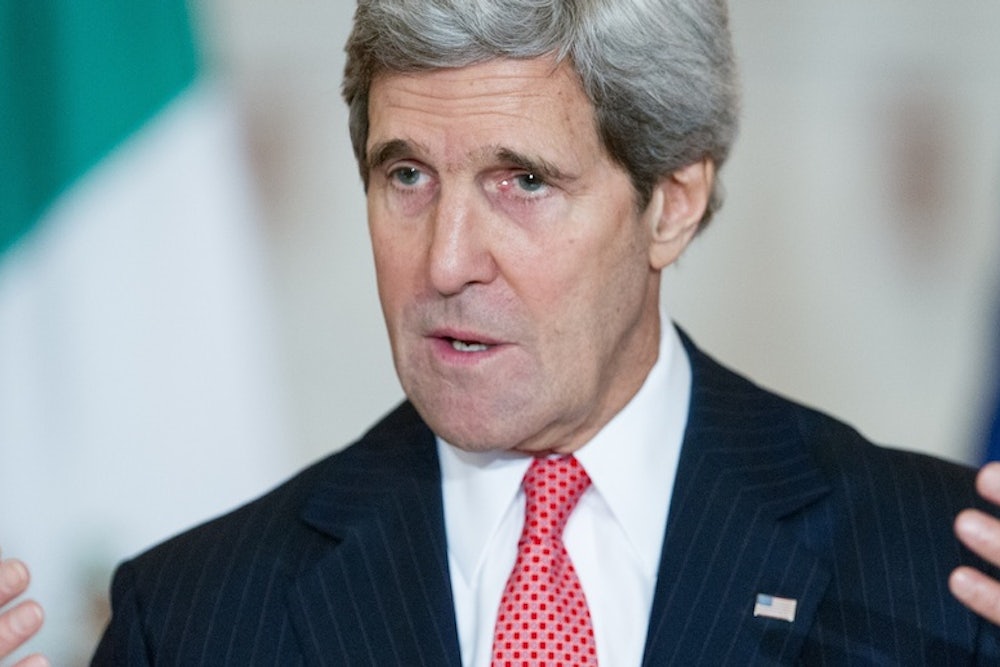In Montreux, Switzerland, 31 foreign ministers (none of them Iranian) will gather Wednesday to inaugurate a conference aimed at putting Syria firmly on the path to political transition. That is the goal, based on the 2012 agreement the upcoming conference is supposed to implement. Two days after ministers have made their speeches, two opposing Syrian delegations are supposed to get down to business in Geneva II. The likelihood of them accomplishing their mission anytime soon is nil. So what is the point?
The agreement is refreshingly straightforward. The Syrian parties' task is to create, on the basis of mutual consent, a transitional governing body exercising full executive powers. In other words, the regime led by Bashar al-Assad is to be relieved of its duties.
When John Kerry became secretary of state, he acknowledged that the calculation of the Assad regime would have to be changed in order for it to negotiate its own exit. For most of 2013 that calculation did indeed change—in the wrong direction. In the wake of the August 21, 2013 chemical atrocity, the United States traded away the credible threat of punitive military strikes for an agreement that would remove Syria's chemical weapons. Assad, no stranger to cynical opportunism, saw himself as a legitimate party to a long-term contract. Worse, he assumed he had been given a permission slip to do as he wished to vulnerable civilians so long as he did it without chemicals. Worse yet, Iran and Russia doubled down on their military support of the regime. So Assad's delegates come to Geneva borne aloft by Iranian-supplied foreign fighters and Russian weaponry.
Is it any wonder, therefore, that regime spokespeople have declared the status of Bashar al-Assad off-limits in Geneva? Or that Assad himself has contemptuously offered the possibility that he will stand for reelection to a seven-year term in June? Kerry recently accused the regime and its supporters of "revisionism" in connect with the political transition mission of Geneva II. The regime, Tehran, and Moscow might well accuse Kerry of revisionism when it comes to the relationship between military reality on the ground and diplomatic results in a conference room.
The Obama administration maintains there is no alternative to Geneva II. Yet Geneva II is the only game in town not as a result of a systematic strategy aimed at achieving specific objectives; it is a diplomatic Hail Mary pass born of unintended consequences deriving from the administration's multi-directional, ad hoc reaction to the chemical atrocity last summer.
Diplomacy is often a matter of making chicken salad out of another substance entirely. Given the unlikelihood of Bashar al-Assad taking practical responsibility for the ruin he has brought to his country, is there anything at all to be gained by the West at Geneva II?
Washington would do well to come to Geneva with a hard-edged, take-no-prisoners attitude. This is no time for even-handed equivocation. Russia can be counted on to support the regime. Any American inclination toward mediation will result in the opposition delegation being isolated and perhaps stampeded out of Geneva.
The Syrian delegation, led by the Syrian National Coalition, should use the Geneva spotlight to reintroduce itself to Syria and to the world. Specifically, it should table the long-awaited alternative to the Assad regime: a transitional governing body roster reflecting excellence, experience, inclusiveness, and decency. Assad has convinced the credulous that the only alternative to him is Islamist extremism, including Al Qaeda. Geneva II is where the Syrian National Coalition can expose Assad's big lie for what it is. It is vital that the opposition keep the conference focused on political transition and that it be supported unequivocally by the United States and its allies to this end.
On the margins of Geneva it may be possible to mitigate Syria's humanitarian nightmare. Russia's role here is marginal: Moscow is not offended in the least by its client's depredations and may lack the requisite leverage anyway. Iran, whose foreign militias keep the regime afloat, at least has leverage. Might it be willing to pressure its client to abandon the worst of its criminal assaults on civilians? This is something for the United States and the Syrian opposition to test.
The process launched at Geneva may take months to play out. Will the United States and its partners use that time to alter Assad's calculation? If not, anything accomplished by Geneva II will be transitory and illusory. For without genuine political transition, Syria's death throes will victimize the innocent and jeopardize the neighborhood, placing American interests at risk. Geneva II cannot be an end in itself. It simply must be part of broader strategy aimed at accomplishing something real: an end to the Assad regime and its replacement by something civilized.
